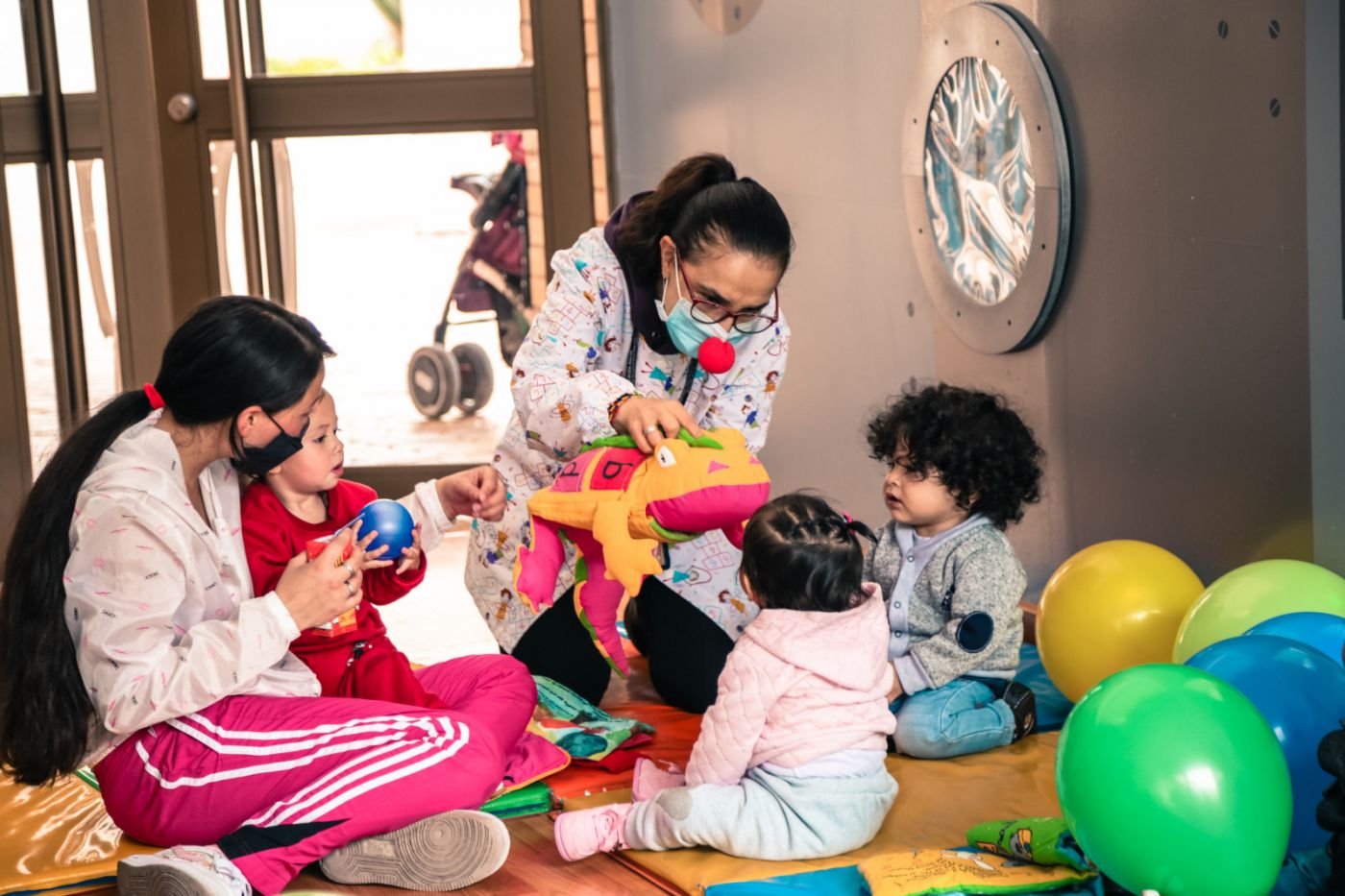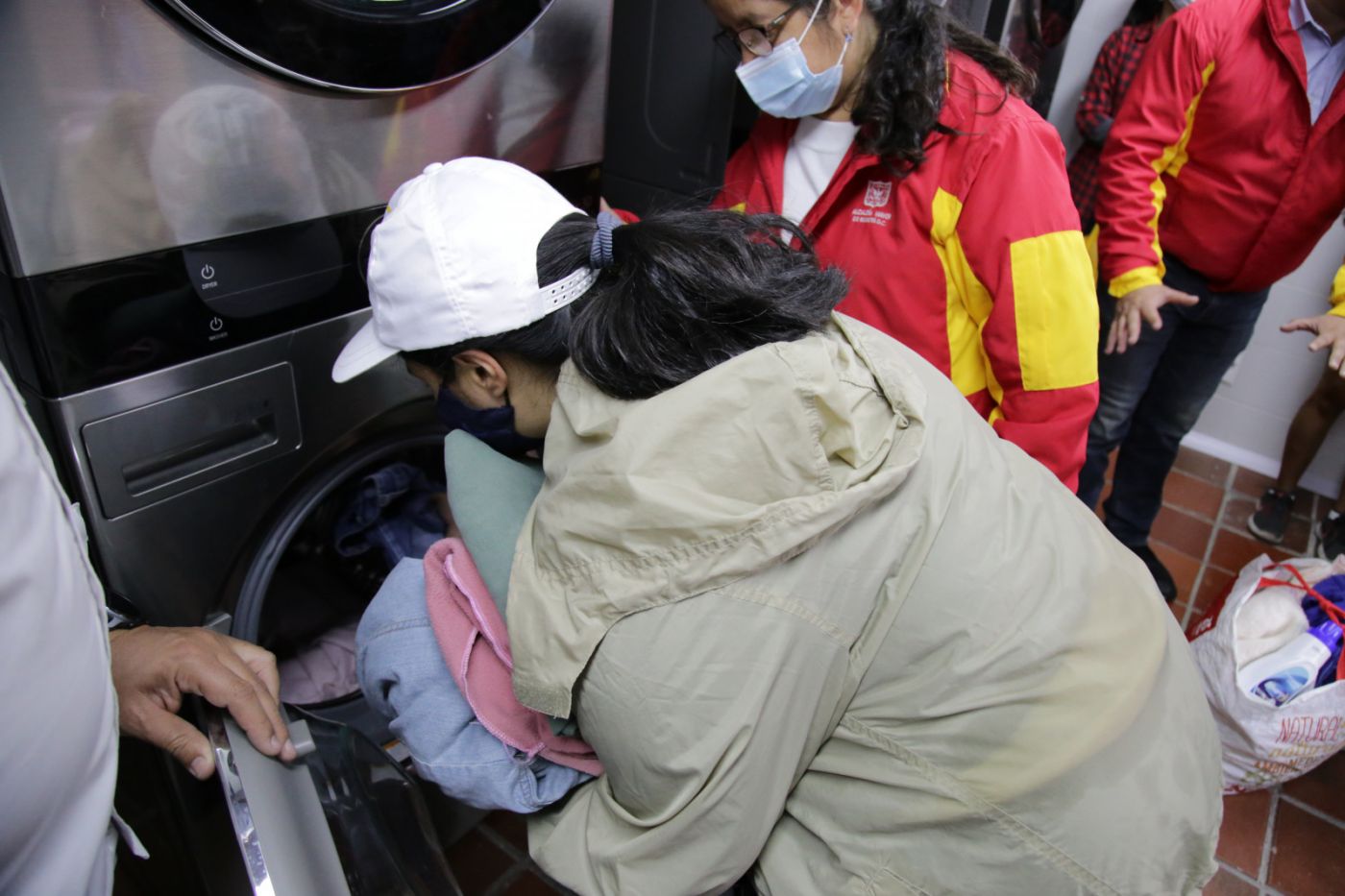Secretaría de la Mujer
This is your first of three free stories this month. Become a free or sustaining member to read unlimited articles, webinars and ebooks.
Become A MemberMyriam Cristina Salazar Lozano left high school at the age of 20, when she became pregnant. Now 58 and separated from her daughter’s father, she cares for her three grandchildren, ever since her daughter left her children’s father because of domestic violence.
Taking care of a teen, a tween and a 3-year-old is hard work, but Lozano has set boundaries and priorities for herself. “Before caring for them I need to care for myself,” she says. “I need to value myself and take care of things. Finishing my high school diploma is a dream of 38 years.”
On a weekday in August, she sat in a classroom at a community center in Bogotá’s Bosa district, a lower-income, working-class area on the southwestern edge of the Colombian capital. In a well-appointed classroom with comfortable desks and modern art on the wall, Lozano and a group of pupils – all women, all older than the usual high school student – work toward their high school diplomas.
This course is part of the suite of offerings through the city’s network of manzanas del cuidado, or care blocks, an initiative of Mayor Claudia López that launched in October 2020 and has grown to 11 such centers around the city.
Through Bogotá’s sistema distrital de cuidado, or citywide system of care, the care blocks provide educational, social, recreational and technical services to caregivers as a form of compensation for their unpaid labor in the so-called care economy.
“We want to take care of those who provide care so they can relax, educate themselves or earn income,” López told Next City in June at the World Urban Forum. “In short, to get out of poverty. Not just income poverty, but also time poverty. Life never slows down.”
This sense of empowerment is exactly the López administration’s goal in pursuing “feminist urbanism” or urban policy through a gender lens. The program was spearheaded by the Latin American feminist movement, a highly organized movement that wields real political influence and has seen major policy wins in the region.

(Photo courtesy Secretaría de la Mujer)
A tour of the Manzana del Cuidado de Bosa shows a dizzying array of activities in the three-story building. A fitness instructor leads a dozen women through an upper body routine with resistance bands and light weights in a gym filled with exercise bikes and workout equipment. While the women work out, a laundry room whirs with washing machines – caregivers are entitled to one free wash per week, to alleviate the estimated one hour and 7 minutes that Bogotá women spend daily handwashing clothes. Elsewhere, women sit in chairs in a hallway waiting for their turn in a private office for free and confidential legal and psychological consultations for issues like domestic violence. In another hall, women line up for job counseling. Five kids play with toys and create art projects in a daycare, while nearby some 30 seniors keep busy in an activity room. These supervised settings are available for caregivers to drop off their charges while availing themselves of services in the center.
Lozano lives a 10-minute walk from the manzana, the city’s second, which served nearly 17,000 caregivers and 1,500 children last year. Bogotá’s Department of Women, which oversees the initiative, selects locations for the blocks based on three criteria: the number of people receiving care in the vicinity, the number of women caregivers below the poverty line as well as input from the city’s participatory budgeting process.
The Manzana del Cuidado de Bosa, however, is not a brand-new facility. The manzana’s name is spelled out on a purple banner hung on the front of the modernist concrete and glass building surrounding a brick plaza. In more permanent lettering on the facade is another name: CDC El Porvenir. This building was already a “center for community development” (CDC) run by a different municipal department and offering technical courses like baking and sewing. The gym and fitness classes likewise already existed. But the López administration believes these community centers were not living up to their full potential, and that caregivers in particular deserve dedicated services.

(Photo courtesy Secretaría de la Mujer)
“We are using the social infrastructure that already exists – health centers, community development centers, libraries, parks, schools – to offer social services for women,” López said.
Today the Mazana del Cuidado de Bosa has over 50 different offerings, from Microsoft Office classes to STI screenings to financial literacy and entrepreneurship workshops to yoga and meditation to coaching for housing subsidy applications. The Women’s Department solicits ideas from a range of public participation tools – most directly, a WhatsApp group that each manzana’s manager maintains, which is how Lozano enrolled in the high school diploma course.
Paula Herrera-Idarraga, a professor at Javeriana University who studies the care economy, acknowledges that the care blocks initiative is “more administrative and organizational” rather than “inventing from nothing.” However, her research justifies why the mayor’s office should focus on women caregivers.
“We know from the statistics that one of the biggest barriers to women’s participation in the labor market are these care duties,” she says. Herrera-Idarraga points to a local survey in which 44% of Bogotá women gave that reason when asked why they weren’t looking for work compared to just 5% of men. National household survey data show that women have double the domestic workload as men in Colombia.
The López administration’s efforts are among the most tangible outcomes of a decade-long fight in the trenches of Colombian politics. In 2010, the congress passed a law requiring the national accounting office to tabulate the contribution of unremunerated caregivers to the Colombian economy. In 2020, that value was estimated at 20% of the country’s GDP.
In response to this data, a group of economists formed the Feminist Economy Roundtable and began lobbying in different parts of Colombia for local government to address the care economy. The demand caught on most fervently in Bogotá, where López ran on a care economy platform with backing from the feminist movement. “Bogotá Cuidadora,” or “Caring Bogotá,” was one of her campaign slogans. When she won the election in 2019, becoming the first woman and first openly gay mayor of Colombia’s capital, she kept her electoral promise and turned the campaign plank into a program.

(Photo courtesy Secretaría de la Mujer)
For Ana Isabel Arenas, a member of the Feminist Economy Roundtable, the capital’s care blocks haven’t led to structural changes to undo gender roles, such as by teaching men to do more cooking, cleaning and caregiving, but she believes Bogotá is on the right track.
“Women have much less of their own income than men and very little use of their own time,” she says. “Those are the two pillars that Bogotá is working on – the theoretical basis is strong.”
While Uruguay, one of the more socially progressive countries in Latin America, has had a national care program since 2005, the roundtable focused on rolling out care programs in cities because Colombia’s national government has historically leaned conservative – a proposed national care system has been stalled in technical planning for years. That calculus changed last month with the inauguration of Gustavo Petro, Colombia’s first leftist president. Francia Márquez, the new vice president and the first Afro-Colombian to hold executive office in Colombia, visited a manzana de cuidado with Mayor López.
“It’s of interest to the national government to recognize the advances of this local initiative to see if it could arrive in other parts of the country,” Herrera-Idarraga says. “The government’s agenda is with the women’s movement, so it could put into place a national system for caregivers.” National resources could also jumpstart the model, as manzana managers are stretched thin at the Bogotá centers.
A national system would reach women that manzanas de cuidado run by well-resourced local governments in big cities cannot. “For rural women, it’s not a solution,” says Arenas. “It will take a long time to attend to all the population in the form most appropriate to them.”
Back at the Manzana del Cuidado de Bosa, Lozano’s teacher finds that caregivers are her best students. “Working with the women is very motivating because they are always very interested,” says instructor Judith Hernández. “I work at a school in the afternoons with boys. You always have to push them to do the work. The women here are always ready to learn.”
This article is part of The Bottom Line, a series exploring scalable solutions for problems related to affordability, inclusive economic growth and access to capital. Click here to subscribe to our Bottom Line newsletter. The Bottom Line is made possible with support from Citi.

Gregory Scruggs is a Seattle-based independent journalist who writes about solutions for cities. He has covered major international forums on urbanization, climate change, and sustainable development where he has interviewed dozens of mayors and high-ranking officials in order to tell powerful stories about humanity’s urban future. He has reported at street level from more than two dozen countries on solutions to hot-button issues facing cities, from housing to transportation to civic engagement to social equity. In 2017, he won a United Nations Correspondents Association award for his coverage of global urbanization and the UN’s Habitat III summit on the future of cities. He is a member of the American Institute of Certified Planners.

20th Anniversary Solutions of the Year magazine